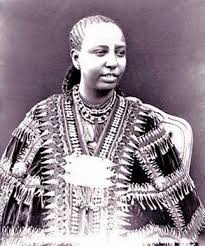Taytu Betul (1851-1918)

Taytu Betul est l’avant-dernière impératrice d’Éthiopie. Avec Ménélik II, roi du Shoa, est son époux, ensemble ils repoussent l’envahisseur italien. Grâce au rôle déterminant de Taytu Betul, l’Éthiopie est le premier pays africain à avoir vaincu une armée coloniale européenne. Elle continue d’être acclamée comme « la lumière de l’Éthiopie ».
Sources :
Ahmed, H. (1999). Faith and trade: the market stalls around the Anwar Mosque in
Addis Ababa Ramadan. Journal of Muslim Minority Affairs, 19(2), 261-268.
Asmare, M. (2012). Historical and Philological Analysis of Taytu Betul’s Biography:
Manuscript Found in National Archieve.
https://www.jeuneafrique.com/451777/societe/taytu-betul-chef-de-guerre-et-lumiere-
de- l’Ethiopie/Taytu Betul, chef de guerre et « Lumière » de l’Éthiopie/
Chris Prouty. (1986), Empress Taytu and Menilek II: Ethiopia, 1883-1910, Ravens
Educational & Development Services, 1986, 409 p.
Hephaestus Books. (2010), Articles on Ethiopian Women, Including: Taytu Betul,
Zewditu I of Ethiopia, Menen Asfaw, Eleni of Ethiopia, Dinqinesh Mercha,
Mentewab, Medferiashwork Hephaestus Books, 56 p
Makana, S. (2019). Women in Nationalist Movements. In Oxford Research
Encyclopedia of AfricanHistory.
https://scholar.google.fr/scholar?hl=fr&as_sdt=0%2C5&q=%22Taytu+BETUL%22+
AND+Ghana&btnG=
Taytu Betul, L’impératrice guerrière
http://www.lisapoyakama.org/taytu-betul-limperatrice-guerriere-qui-dirigea-lethiopie/
Taytu Betul : l'avènement d'une Etege – Page 43
https://books.google.sn
Tripp, A. M. (2017). Women and politics in Africa. In Oxford Research Encyclopedia
of African History.

